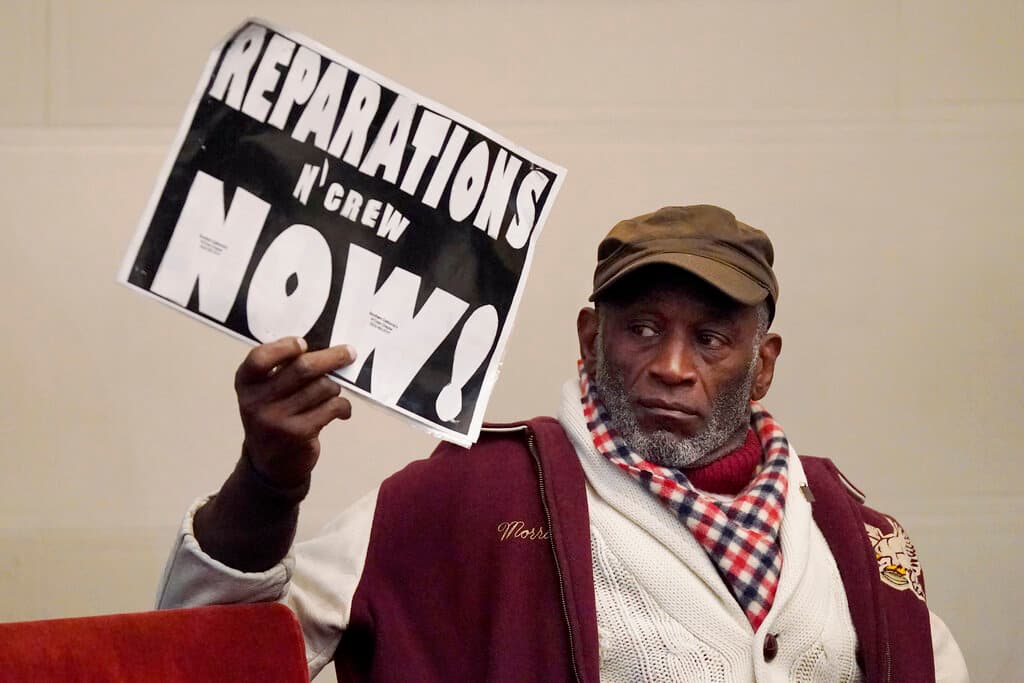Slavery Reparations Advocates Are Undeterred by Supreme Court’s Colorblind Ruling, Denying Proposed Payments Are ‘Race-Based’
Money paid to descendants of slaves would be ‘based on lineal descent,’ says the head of Coast task force.

Last month, on the same day the Supreme Court declared college admissions based on race unconstitutional, the head of the California task force at the forefront of the national reparations effort, Kamilah Moore, announced on Twitter that her cause is not affected by the decision: “Our reparations recommendations are not race-based, but rather are based on lineal descent.”
It’s a subtle distinction stemming from the California Reparations Task Force’s razor-thin 5-4 vote last year to restrict eligibility for reparations only to California residents who qualify by lineal descendant — either from an enslaved African-American or from a free African-American person living in America prior to the end of the 19th century. That eligibility criterion will exclude several hundred thousand Black people living in California — namely Caribbean, African, and South American Black immigrants who arrived in this country in the 20th century.
As Ms. Moore affirmed that the task force’s work would endure, it rolled out an ambitious reparations program for an estimated 2 million Black residents, containing more than 100 proposals, including free college tuition, a guaranteed income program, and cash payments that could exceed $1 million for some eligible African-Americans.
The demands, now in the hands of state legislators, would cost California taxpayers an estimated $500 billion to $800 billion if enacted, and lawsuits are virtually assured, as reparations skeptics consider eligibility by lineage to be a proxy for race. They also oppose the task force’s recommendation to repeal Prop 209, a statewide ban on racial preferences in government hiring, contracting, and college admissions that was reaffirmed by 57 percent of voters in a 2020 referendum.
“First and foremost, this is a legal matter. It will be challenged, if not by us, then by someone else,” the executive director of the California for Equal Rights Foundation, Wenyuan Wu, said. The foundation is a lead group in the 2020 effort upholding Prop 209.
Opponents are expected to challenge some of the historical claims as distortions or one-sided. A UCLA law professor, Richard Sander, who has spent his career researching the downsides of racial preferences, said the task force report is infused with Critical Race Theory, reducing complex history to simplistic explanations.
“A big challenge is going to be to put out an accurate counter-narrative,” Mr. Sander said. “One valuable thing from this process is the public can see what the critical race studies worldview and agenda is.”
Such responses might cite, for example, recent studies indicating that redlining — a practice of excluding risky neighborhoods from home lending programs and other financial services — may have affected more whites than Blacks, even if Blacks were disproportionately affected because of relative poverty and racial animus.
Aclinical professor of law at Cornell Law School William Jacobson, who is president of the Legal Insurrection Foundation, which runs conservative websites, said the task force presumes every Black person is a powerless victim who deserves compensation — precisely the sort of crude stereotyping the Supreme Court majority has rejected.
Mr. Jacobson further said that calculating only harms without considering “the other side of the ledger” — like government assistance or other benefits someone’s parents or grandparents may have accrued over a lifetime — is dishonest.
“Reparations of this kind will likely lead to inter-racial and inter-ethnic strife — just the opposite of what California’s leaders should be trying to do,” said a University of San Diego law professor, Gail Heriot, who helped lead the movement to defeat racial preferences in 2020 as co-chairwoman of the Californians 4 Equal Rights/No on Prop 16. “It’s unlikely to go down well with the people who are paying the taxes for this.”
An attorney with the Pacific Legal Foundation, a conservative public interest law practice that challenged the Biden administration’s debt-relief program for non-white farmers, Glenn Roper, said the task force report presents a radical challenge to the constitutional principle of equal protection.
“This would be a sweeping overhaul of the whole equal protection project,” Mr. Roper said. “It’s really going to be a pivotal test whether equal protection, colorblindness and race neutrality can withstand the moment.”
“We’ve gone from the bright optimism of the civil rights era, to the peevish political correctness of the 1990s, and on to the Age of Wokeness in which young African-Americans are being told that they can’t possibly achieve, because everything about the world is rigged against them,” Ms. Heriot said. “It’s highly destructive.”
Reparations advocates see otherwise. “For those reactionaries who say slavery is old news and the time for reparations has passed, well, you know what, I’ve been a civil rights lawyer for 20 years and I say show me the statute of limitations on mass genocide,” said task force member Lisa Holder at the panel’s final meeting last month. “Show me the statute of limitations on the world’s greatest crime against humanity and show me the statute of limitations on accountability for original sin.”
This article was adapted from a RealClearInvestigations article published July 6.

